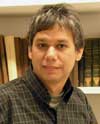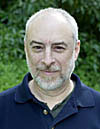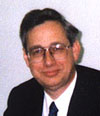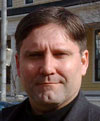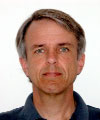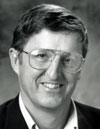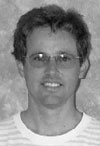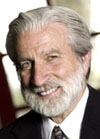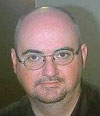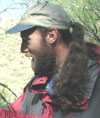D-Lib Magazine
|
Reed Beaman
Reed Beaman is Associate Director for Biodiversity Informatics at the Yale University Peabody Museum. The Peabody Museum houses over 11 million natural history specimens, including significant historical collections and tens of thousands of types (the original specimens used when a new species of plant or animal was first described to science). Beaman's research is focused on developing rapid data capture methodologies, including geospatial referencing, for natural history collections. Before joining the Peabody he completed a National Science Foundation fellowship in Biological Informatics at the University of Kansas Natural History Museum and the Royal Botanic Gardens, Sydney. His research interests also include biogeography and plant systematics of Mount Kinabalu, a biodiversity hotspot in Malaysian Borneo.
To return to Reed Beaman's article, click (here).
Stan Blum
Stan Blum is the Research Information Manager at the California Academy of Sciences, in San Francisco. He is a zoologist by training (Ph.D. University of Hawaii, 1988), but has been working full-time in biodiversity informatics since 1990. The two most important themes in his work have been designing data management systems that support information integration across workgroups and data types within an organization, and developing standards and software architectures that support information integration across organizations. He is an active participant in two international organizations dedicated to biodiversity informatics, the Taxonomic Databases Working Group (http://www.tdwg.org) and the Global Biodiversity Information Facility (http://www.gbif.org).
To return to Stan Blum's article, click (here).
Michael Buckland
Michael Buckland is Co-Director of the Electronic Cultural Atlas Initiative, University of California, Berkeley and also Emeritus Professor in the School of Information Management and Systems. He worked as a librarian and as an academic administrator in England and the U.S.A. His writings include Library Services in Theory and Context (Pergamon, 1983; 2nd ed. 1988), Information and Information Systems (Praeger, 1991), and Redesigning Library Services (American Library Association, 1992). Recent research has been on making better use of existing metadata.
To return to Michael Buckland's article, click (here).
Gregory Crane
Originally trained as a classicist, Gregory Crane has been developing digital libraries for almost twenty years. He is the director of the Perseus Digital Library and his research centers on the interactions between new information technologies and evolving practices of inquiry. He is particularly interested in the application of language technologies to digital library services and in supporting multi-lingual inquiry.
To return to Gregory Crane's article, click (here).
James Frew
James Frew is an Assistant Professor in the Donald Bren School of Environmental Science and Management at the University of California, Santa Barbara (UCSB), and a principal investigator in UCSB's Institute for Computational Earth System Science (ICESS). His academic background includes remote sensing, image processing, and snow hydrology, and he has been a co-PI on the Alexandria Digital Library Project since it began in 1994. His current research encompasses applications of computing technology to environmental problems, particularly involving digital geolibraries and Earth science workflow management.
To return to James Frew's article, click (here).
Michael F. Goodchild
Michael F. Goodchild is Professor of Geography at the University of California, Santa Barbara; Chair of the Executive Committee, National Center for Geographic Information and Analysis (NCGIA); Associate Director of the Alexandria Digital Library Project; and Director of NCGIA's Center for Spatially Integrated Social Science. He received his B.A. degree from Cambridge University in Physics in 1965 and his Ph.D. in Geography from McMaster University in 1969. After 19 years at the University of Western Ontario he moved to Santa Barbara in 1988. He was elected member of the National Academy of Sciences and Foreign Fellow of the Royal Society of Canada in 2002. He is the author or editor of 12 books and over 350 papers.
To return to Michael Goodchild's article, click (here).
Chris Higgins
Chris Higgins is part of the GeoData Services team at the EDINA National Data Centre. He leads the team running the Digimap online service making Ordnance Survey GB data available to universities throughout Britain. Chris has degrees in Ecology, Information Technology and GIS. He represents EDINA on the board of the Association for Geographic Information (Scotland) and regularly attends Open GIS Consortium (OGC) Technical Committee meetings. At the moment, his particular interest is the relationships between web services, Grid services and OGC.
To return to Chris Higgins' article, click (here).
Linda L. Hill
Linda L. Hill is a research specialist with the Alexandria Digital Library Project at the University of California, Santa Barbara, currently working on gazetteer design and development and on the integration of knowledge organization systems (KOS) into digital library services. She received her Ph.D. in Library Science from the University of Pittsburgh in 1990 and has worked in the fields of georeferenced digital libraries, interoperable digital gazetteer services, user evaluation of information systems, user needs analysis, information services workflow analysis, hierarchical thesaurus construction for information description and retrieval, networked knowledge organization systems (NKOS), and metadata design. More information about Linda Hill is available at her web site http://www.alexandria.ucsb.edu/~lhill.
To return to Linda Hill's article, click (here).
To return to Linda Hill's guest editorial, click (here).
Greg Janée
Greg Janée is technical leader of the Alexandria Digital Library Project, principal developer of the Alexandria Digital Library software, and developer of the ADL gazetteer and thesaurus protocols. He is currently working on federated digital library architectures supporting Earth science data. Greg has an M.S. in computer science and a B.S. in mathematics, both from the University of California at Santa Barbara. His experience prior to the Alexandria project was in the private sector in the areas of object-oriented class libraries; 2D, 3D and fractal-based visualization; rule-based expert systems; scripting and query languages; and database systems.
To return to Greg Janée's article, click (here).
Lewis Lancaster
Lewis R. Lancaster is the founding Director of the Electronic Cultural Atlas Initiative, University of California, Berkeley, and President of the University of the West (Rosemead, CA). He has degrees in English Literature, Comparative Religion, and Buddhist Studies, was previously Chen Distinguished Professor of Buddhist Studies at Berkeley, and has long been active in the digitization of ancient Buddhist texts. For more information about Dr. Lancaster, see <http://www.hlu.edu/uwest1/president.html>.
To return to Lewis Lancaster's article, click (here).
David Medyckyj-Scott
David is the Manager of Research and Geo-data Services at the EDINA National Data Centre. He has a varied background taking in cartography, psychology, spatial data management, metadata, software engineering and Internet services development. While working for Landcare Research Ltd (New Zealand), David co-developed the GUILD-on-the-Web. Released in January 1996, GUILD one of the first on-line GIS services accessible via the Web. He was the driving force behind the EDINA Digimap service, an innovative, cutting edge service providing on-line access to Ordnance Survey GB digital map data. David has an ongoing interest in GI portals, gazetteers and web map services.
To return to David Medyckyj-Scott's article, click (here).
James S. Reid
James S. Reid is based at the GeoData Services team of the EDINA National Datacenter, University of Edinburgh. He is currently National Service Coordinator for the UKBORDERS service, project manager for the geoXwalk project and Business Development Officer. He has previously worked in various public sector organisations as well as in a range of university posts. His particular areas of interest include gazetteers, geoparsing, spatial databases and geocaching.
To return to James Reid's article, click (here).
Andrew Robson
Andrew Robson has been a professional software developer since 1996. In 2002 he joined the Geo-services team in the EDINA/Data Library at the University of Edinburgh. While at EDINA, he developed the GeoXwalk middleware which enables software clients to cross-search geographical datasets and to frame spatially aware queries. He has related interests in OpenGIS Web Service standards and geo-ontologies. He holds an M.A. and M.Sc. from Glasgow University.
To return to Andrew Robson's article, click (here).
John Wieczorek
John Wieczorek is a Programmer/Analyst for the Museum of Vertebrate Zoology at UC Berkeley where he was originally hired to bring the museum's collections data to the web. He has since been involved in the development of the Distributed Generic Information Retrieval (DiGIR, http://digir.net) protocol and several distributed collection data networks (MaNIS, HerpNet, ORNIS) based on it. He is co-convenor for the Spatial Data subgroup of the Taxonomic Database Working Group and member of the Science Subcommittee for the Data Access and Database Interoperability work programme of the Global Biodiversity Information Facility.
To return to John Wieczorek's article, click (here).
Copyright © 2004 Corporation for National Research Initiatives
Top | Contents
Search | Author Index | Title Index | Back Issues
E-mail the Editor
DOI: 10.1045/may2004-authors
